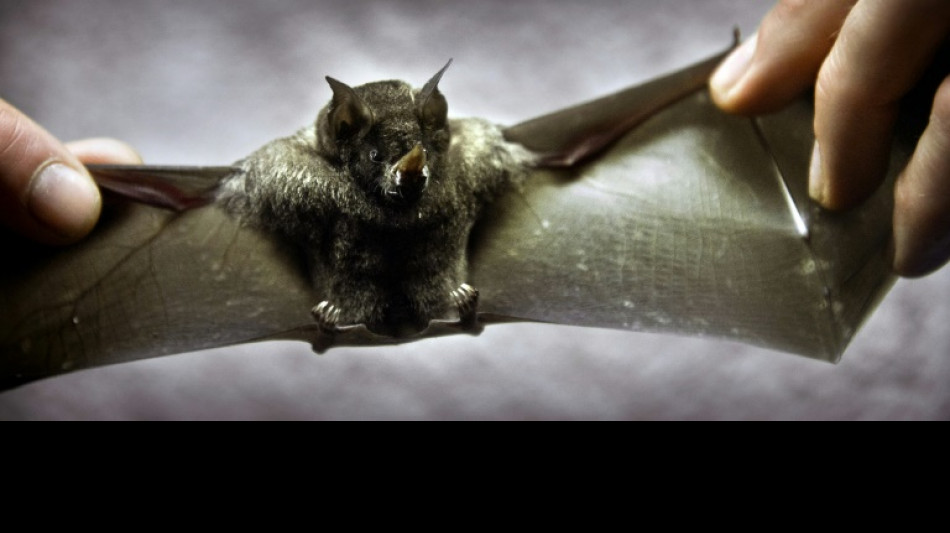
-
 Primary schools empty as smog persists in Indian capital
Primary schools empty as smog persists in Indian capital
-
Palestinians turn to local soda in boycott of Israel-linked goods

-
 Typhoon Man-yi bears down on Philippines still reeling from Usagi
Typhoon Man-yi bears down on Philippines still reeling from Usagi
-
UK growth slows in third quarter, dealing blow to Labour government

-
 Chris Wood hits quickfire double in NZ World Cup qualifying romp
Chris Wood hits quickfire double in NZ World Cup qualifying romp
-
Markets struggle at end of tough week

-
 China tests building Moon base with lunar soil bricks
China tests building Moon base with lunar soil bricks
-
Film's 'search for Palestine' takes centre stage at Cairo festival

-
 Oil execs work COP29 as NGOs slam lobbyist presence
Oil execs work COP29 as NGOs slam lobbyist presence
-
Gore says climate progress 'won't slow much' because of Trump

-
 'Megaquake' warning hits Japan's growth
'Megaquake' warning hits Japan's growth
-
Stiff business: Berlin startup will freeze your corpse for monthly fee

-
 Wars, looming Trump reign set to dominate G20 summit
Wars, looming Trump reign set to dominate G20 summit
-
Xi, Biden attend Asia-Pacific summit, prepare to meet

-
 Kyrgios to make competitive return at Brisbane next month after injuries
Kyrgios to make competitive return at Brisbane next month after injuries
-
Dominican Juan Luis Guerra triumphs at 25th annual Latin Grammys

-
 Landslide win for Sri Lanka president's leftist coalition in snap polls
Landslide win for Sri Lanka president's leftist coalition in snap polls
-
Australian World Cup penalty hero Vine takes mental health break

-
 As Philippines picks up from Usagi, a fresh storm bears down
As Philippines picks up from Usagi, a fresh storm bears down
-
Tropical Storm Sara pounds Honduras with heavy rain

-
 Pepi gives Pochettino win for USA in Jamaica
Pepi gives Pochettino win for USA in Jamaica
-
'Hell to heaven' as China reignite World Cup hopes with late winner

-
 Rebel attacks keep Indian-run Kashmir on the boil
Rebel attacks keep Indian-run Kashmir on the boil
-
New Zealand challenge 'immense but fantastic' for France

-
 Under pressure England boss Borthwick in Springboks' spotlight
Under pressure England boss Borthwick in Springboks' spotlight
-
All Blacks plan to nullify 'freakish' Dupont, says Lienert-Brown

-
 TikTok makes AI driven ad tool available globally
TikTok makes AI driven ad tool available globally
-
Japan growth slows as new PM readies stimulus

-
 China retail sales pick up speed, beat forecasts in October
China retail sales pick up speed, beat forecasts in October
-
Asian markets fluctuate at end of tough week

-
 Gay, trans people voicing -- and sometimes screaming -- Trump concerns
Gay, trans people voicing -- and sometimes screaming -- Trump concerns
-
Argentina fall in Paraguay, Brazil held in Venezuela

-
 N. Korean leader orders 'mass production' of attack drones
N. Korean leader orders 'mass production' of attack drones
-
Pakistan's policies hazy as it fights smog

-
 Nature pays price for war in Israel's north
Nature pays price for war in Israel's north
-
New Zealand's prolific Williamson back for England Test series

-
 Mexico City youth grapple with growing housing crisis
Mexico City youth grapple with growing housing crisis
-
After Trump's victory, US election falsehoods shift left

-
 Cracks deepen in Canada's pro-immigration 'consensus'
Cracks deepen in Canada's pro-immigration 'consensus'
-
Xi inaugurates South America's first Chinese-funded port in Peru

-
 Tyson slaps Paul in final face-off before Netflix bout
Tyson slaps Paul in final face-off before Netflix bout
-
England wrap-up T20 series win over West Indies

-
 Stewards intervene to stop Israel, France football fans clash at Paris match
Stewards intervene to stop Israel, France football fans clash at Paris match
-
Special counsel hits pause on Trump documents case

-
 Japan's Princess Mikasa, great aunt to emperor, dies aged 101
Japan's Princess Mikasa, great aunt to emperor, dies aged 101
-
Cricket at 2028 Olympics could be held outside Los Angeles

-
 Trump names vaccine skeptic RFK Jr. to head health dept
Trump names vaccine skeptic RFK Jr. to head health dept
-
Ye claims 'Jews' controlling Kardashian clan: lawsuit

-
 Japan into BJK Cup quarter-finals as Slovakia stun USA
Japan into BJK Cup quarter-finals as Slovakia stun USA
-
Sri Lanka president's party headed for landslide: early results

| RBGPF | 100% | 61.84 | $ | |
| BCC | -1.57% | 140.35 | $ | |
| CMSC | -0.24% | 24.55 | $ | |
| BCE | -1.38% | 26.84 | $ | |
| RIO | -0.31% | 60.43 | $ | |
| SCS | -0.75% | 13.27 | $ | |
| JRI | -0.23% | 13.21 | $ | |
| NGG | 0.4% | 62.37 | $ | |
| GSK | -2.09% | 34.39 | $ | |
| RYCEF | -4.71% | 6.79 | $ | |
| RELX | -0.37% | 45.95 | $ | |
| CMSD | -0.02% | 24.725 | $ | |
| AZN | -0.38% | 65.04 | $ | |
| BTI | 0.2% | 35.49 | $ | |
| VOD | -0.81% | 8.68 | $ | |
| BP | 1.65% | 29.05 | $ |

The age of outbreaks: Experts warn of more animal disease threats
With the spread of monkeypox across the world coming hot on the heels of Covid-19, there are fears that increasing outbreaks of diseases that jump from animals to humans could spark another pandemic.
While such diseases -- called zoonoses -- have been around for millennia, they have become more common in recent decades due to deforestation, mass livestock cultivation, climate change and other human-induced upheavals of the animal world, experts say.
Other diseases to leap from animals to humans include HIV, Ebola, Zika, SARS, MERS, bird flu and the bubonic plague.
The World Health Organization said on Thursday that it is still investigating the origins of Covid, but the "strongest evidence is still around zoonotic transmission".
And with more than 1,000 monkeypox cases recorded globally over the last month, the UN agency has warned there is a "real" risk the disease could become established in dozens of countries.
The WHO's emergencies director Michael Ryan said last week that "it's not just in monkeypox" -- the way that humans and animals interact has become "unstable".
"The number of times that these diseases cross into humans is increasing and then our ability to amplify that disease and move it on within our communities is increasing," he said.
Monkeypox did not recently leap over to humans -- the first human case was identified in DR Congo in 1970 and it has since been confined to areas in Central and Western Africa.
Despite its name, "the latest monkeypox outbreak has nothing to do with monkeys," said Olivier Restif, epidemiologist at the University of Cambridge.
While it was first discovered in macaques, "zoonotic transmission is most often from rodents, and outbreaks spread by person-to-person contact," he told AFP.
- Worse yet to come? -
Around 60 percent of all known human infections are zoonotic, as are 75 percent of all new and emerging infectious diseases, according to the UN Environment Programme.
Restif said the number of zoonotic pathogens and outbreaks have increased in the past few decades due to "population growth, livestock growth and encroachment into wildlife habitats".
"Wild animals have drastically changed their behaviours in response to human activities, migrating from their depleted habitats," he said.
"Animals with weakened immune systems hanging around near people and domestic animals is a sure way of getting more pathogen transmission."
Benjamin Roche, a specialist in zoonoses at France's Institute of Research for Development, said that deforestation has had a major effect.
"Deforestation reduces biodiversity: we lose animals that naturally regulate viruses, which allows them to spread more easily," he told AFP.
And worse may be to come, with a major study published earlier this year warning that climate change is ramping the risk of another pandemic.
As animals flee their warming natural habitats they will meet other species for the first time -- potentially infecting them with some of the 10,000 zoonotic viruses believed to be "circulating silently" among wild mammals, mostly in tropical forests, the study said.
Greg Albery, a disease ecologist at Georgetown University who co-authored the study, told AFP that "the host-pathogen network is about to change substantially".
- 'We have to be ready' -
"We need improved surveillance both in urban and wild animals so that we can identify when a pathogen has jumped from one species to another -- and if the receiving host is urban or in close proximity to humans, we should get particularly concerned," he said.
Eric Fevre, a specialist in infectious diseases at Britain's University of Liverpool and the International Livestock Research Institute in Kenya, said that "a whole range of new, potentially dangerous diseases could emerge -- we have to be ready".
This includes "focusing the public health of populations" in remote environments and "better studying the ecology of these natural areas to understand how different species interact".
Restif said that there is "no silver bullet -- our best bet is to act at all levels to reduce the risk".
"We need huge investment in frontline healthcare provision and testing capacity for deprived communities around the world, so that outbreaks can be detected, identified and controlled without delays," he said.
On Thursday, a WHO scientific advisory group released a preliminary report outlining what needs to be done when a new zoonotic pathogen emerges.
It lists a range of early investigations into how and where the pathogen jumped to humans, determining the potential risk, as well as longer-term environmental impacts.
W.Morales--AT



